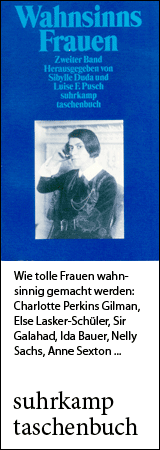Biographies Michelle Bachelet Jería

(Dr. Verónica Michelle Bachelet Jería)
Born 29 September 1951 in Santiago, Chile
Chilean political leader, pediatrician and epidemiologist; Minister of Health (2000-2002); Minister of Defense (2002-2004); President of the Republic of Chile (2006-2010); Executive Director, UN Women, 2010-2013; candidate of New Majority alliance for President of the Republic of Chile, 2013
Biography • Literature & Sources
Biography
In 2006 the first democratically elected female president in South America (who was not the wife of a former president or leader) began a four-year term in the continent’s possibly most conservative nation. Michelle Bachelet said of herself at the time that she embodied “everything that counts as a mortal sin in Chile” – she was female, socialist, agnostic and had separated from her husband. Prevented by Chile’s constitution from succeeding herself, the popular center-left leader is expected to win a second term in a runoff election in December 2013.
Bachelet’s father, an air force general under Salvador Allende, was tortured after Pinochet’s brutal coup and died in prison in 1974. The young Socialist and medical student Michelle and her anthropologist mother Ángela Jeria were both also arrested and tortured. After weeks in prison the two went into exile, first in Australia and then in the German Democratic Republic, where Michelle continued her medical studies at Berlin’s Humboldt University. She returned to Chile in 1979, finished her degree in 1982 at the University of Chile in Santiago, and completed additional specialties in pediatrics and epidemiology by 1986. From 1986 to 1990 Bachelet directed the medical department of an NGO which assisted children of the victims of the Junta.
After Pinochet’s fall in 1990 Bachelet took a position with the Ministry of Health. From 1996 to 1998 she studied national security and military strategy in Santiago and at the Inter-American Defense College in Washington, D.C. She then worked as an adviser in the Chilean Defense Ministry. In 2000 President Ricardo Lagos appointed Michelle Bachelet to be Minister of Health, and in 2002 named her as Defense Minister, the first female defense minister in Chile – indeed, in all of Latin America. Bachelet rapidly earned respect and approval in these posts and showed herself to be strong-willed and effective in her campaign to democratize the military.
The popular mother of three who speaks five languages was urged to campaign for president in 2004. She became the Socialist candidate in 2005 and in the runoff election against the conservative media mogul Piñera she won 53.5 per cent of the vote. In her 2006 inaugural address she called on her countrymen and women to strive for reconciliation, for the integration of socially marginalized groups and for an end to social injustice.
The new head of state immediately tackled the social disparities of her country: she strove for a more equitable income distribution and a reform of the educational system and filled exactly 50% of the ministerial positions with women, as she had promised in her campaign. But she also retained the growth-oriented free market economy of her center-left coalition Concertación – policies that were fostered by a constitution dating from the Pinochet era. Further, Bachelet steered her foreign policy more in the direction of Brazil’s Lula da Silva than Venezuela’s Chavez.
The first months of her term as president were overshadowed by the mass protests of high school students who took to the streets in May and June to call attention to serious problems in the educational system. Supported by teachers, university students and unions, they organized two national strikes. In 2007 demonstrations for greater social participation further challenged her administration, and in January 2008 the indigenous Mapuche people demanded the right of self-determination over regions they had traditionally inhabited. To maintain the initiative in her coalition and successfully promulgate her social reforms Bachelet reconfigured the major positions in her administration more than ten times.
In foreign policy Bachelet was successful in crafting several bilateral cooperative trade agreements, for example with Spain and Japan. Based on its economic strength Chile was invited to join the Organization for Economic Cooperation and Development (OECD) in 2009, which it did on 11 January 2010, the first South American nation to do so. But despite a growing economy, the gap between rich and poor remained and is a major problem today.
Although Bachelet enjoyed great personal popularity at the end of four years, she was prohibited by the constitution from running for a second term. The candidate of her center-left coalition, Eduardo Frei, was defeated by the multimillionaire Sebastián Piñera, Bachelet’s earlier opponent, who was sworn into office on 11 March 2010.
In September 2010 UN General Secretary Ban Ki Moon named Michelle Bachelet to head the new women’s organization United Nations Entity for Gender Equality and the Empowerment of Women (UN Women, http://www.unwomen.org//), which pulled together four previously separate UN departments. As Executive Director Bachelet led the UN’s efforts for justice, equality and progress for women and girls throughout the world until March 2013, when she resigned and returned to Chile in order to campaign for a second term as president.
Bachelet handily won the four-way primary in July with 73 percent of the vote, to become the candidate of her center-left Concertación coalition, which further joined with the Communist Party to form the New Majority alliance. Campaigning on a platform to reduce Chile’s social and economic inequality through reforms in education, health, social security and taxes as well as in the Junta-era constitution, Bachelet won 47 percent of the vote in the first round of the election in November, against 8 other candidates. Her main rival, Evelyn Matthei, representing the conservative alliance presently in power in Chile, received 25 percent. Matthei, an economist and former minister of labor under President Piñera, is – like Bachelet – a general’s daughter. Her father, however, had been a member of Pinochet’s repressive Junta, which caused the death of Bachelet’s father and drove her mother and herself into exile.
Author: Joey Horsley
Literature & Sources
For literature and links please see the German page.
If you hold the rights to one or more of the images on this page and object to its/their appearance here, please contact Fembio.



